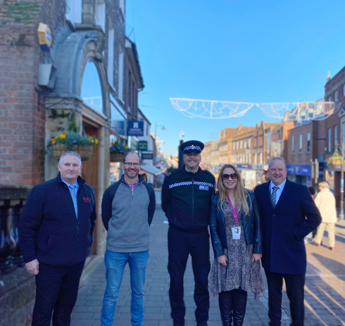Newbury town centre has a new, wireless public space CCTV system. It represents, writes Mark Rowe, a working out of a new way of making public space surveillance (PSS) in small towns after the previous model – funded and monitored by a district council – faltered or failed altogether during the 2010s public sector austerity.
West Berkshire Council, based in Newbury, ran a typical 2000s-era analogue CCTV system over BT fibre. By 2016, however, the council like others of the same size decided to give up the CCTV as a ‘non statutory service’ (that is, unlike libraries or waste collection, a council by law does not have to have CCTV). Instead, West Berkshire proposed to wash its hands of CCTV, arguing that ‘if the appropriate Parish and Town Councils and other partners value this service then they should be asked to develop their own bespoke models appropriate for their areas for this service whether this be a live or passive system’. By live or passive West Berkshire meant having operators in a control room (‘live’) or cameras recording but without monitoring (‘passive’).
As in other places, it meant that others inherited the ageing CCTV that was at the same time in need of ever more repair and was causing high running costs. As in other towns, it fell to the Newbury BID (Business Improvement District).
Operations Manager Alison Drummond, pictured second from right, joined the BID in 2020. She worked with the local shopping centre, Kennet Centre Manager, Richard Farley and Thames Valley Police, to determine what new CCTV to seek. The BID went through a procurement process to find a suitable system and cameras. Thames Valley Police and Newbury Town Council fund the CCTV while Newbury BID continues to provide resource and management time, on behalf of the town centre’s businesses, as part of the BID service.
By going with new supplier, Scion, and from fibre to wireless, the operating costs are significantly reduced, the BID says, meaning the current funding will cover all costs until 2025.
Alison Drummond says: “While we are more than happy to take on the responsibility of the CCTV out of goodwill for the benefit of the town and our levy-payers, if we are unsuccessful in our upcoming BID Ballot, our responsibility and management for the town centre CCTV will end on May 31, alongside all Visit Newbury marketing and free events for Newbury.”
A further example of how small towns can make public space CCTV work – in Chippenham in north Wiltshire – featured in the October and November print editions of Professional Security magazine.
In the rest of West Berkshire district, Thatcham’s CCTV is run now by the town council.
Background
Britain has hundreds (is anyone counting?!) of Business Improvement Districts, mostly in town and city centres; some cities such as London and Birmingham have several on high streets besides downtown. BIDs are voted for by each business in the catchment area. If voted in, a BID then levies each business, and spends the income on, typically, street cleaning, security patrolling, marketing, or general quality of life services to make the area more attractive to work in, shop in or visit. The advantage of a BID over a similar business crime reduction partnership (BCRP) is that in a BID premises can’t free-load, and not pay to be a member yet share the benefits of a safer or smarter-looking district with paying members.
A BID has to go out to ballot every five years; Newbury is shortly to ballot for a third term, to 2027.
Photo courtesy of Newbury BID, Northbrook Street.










